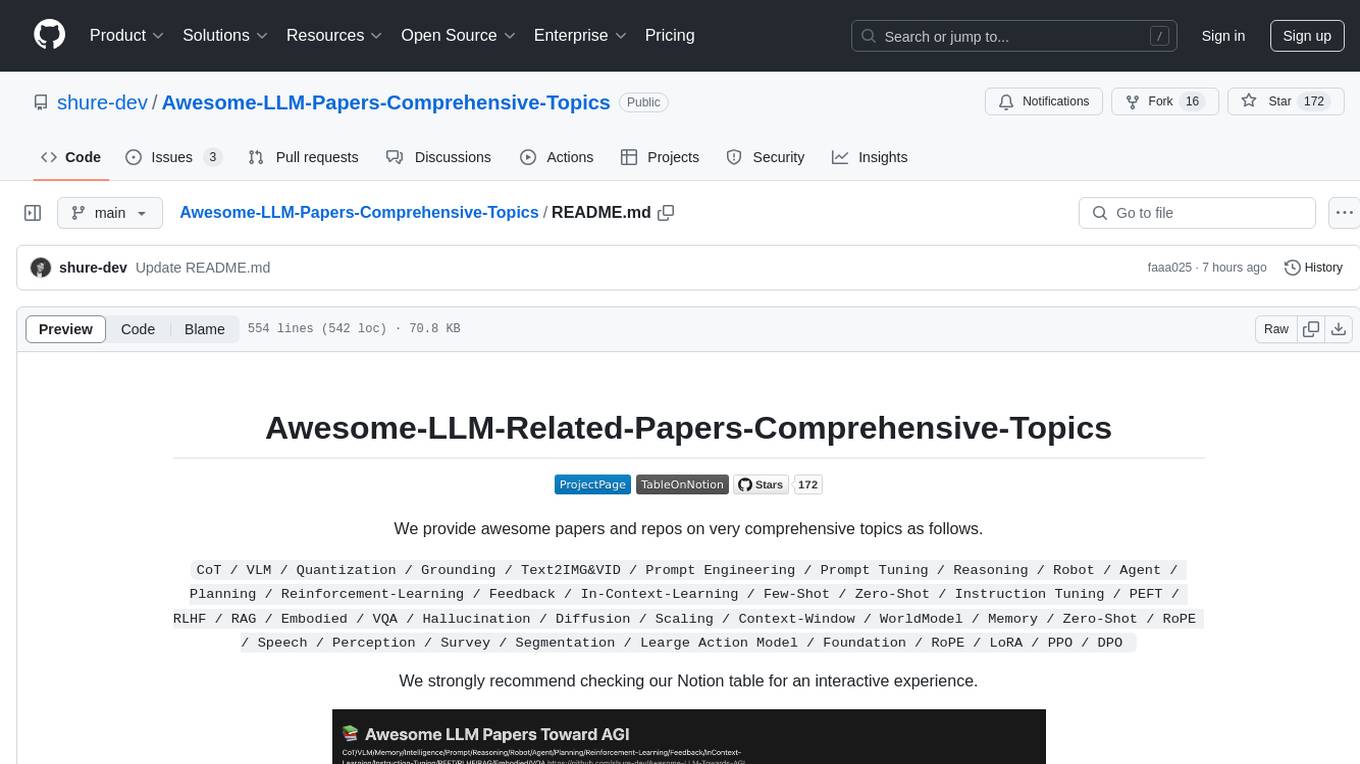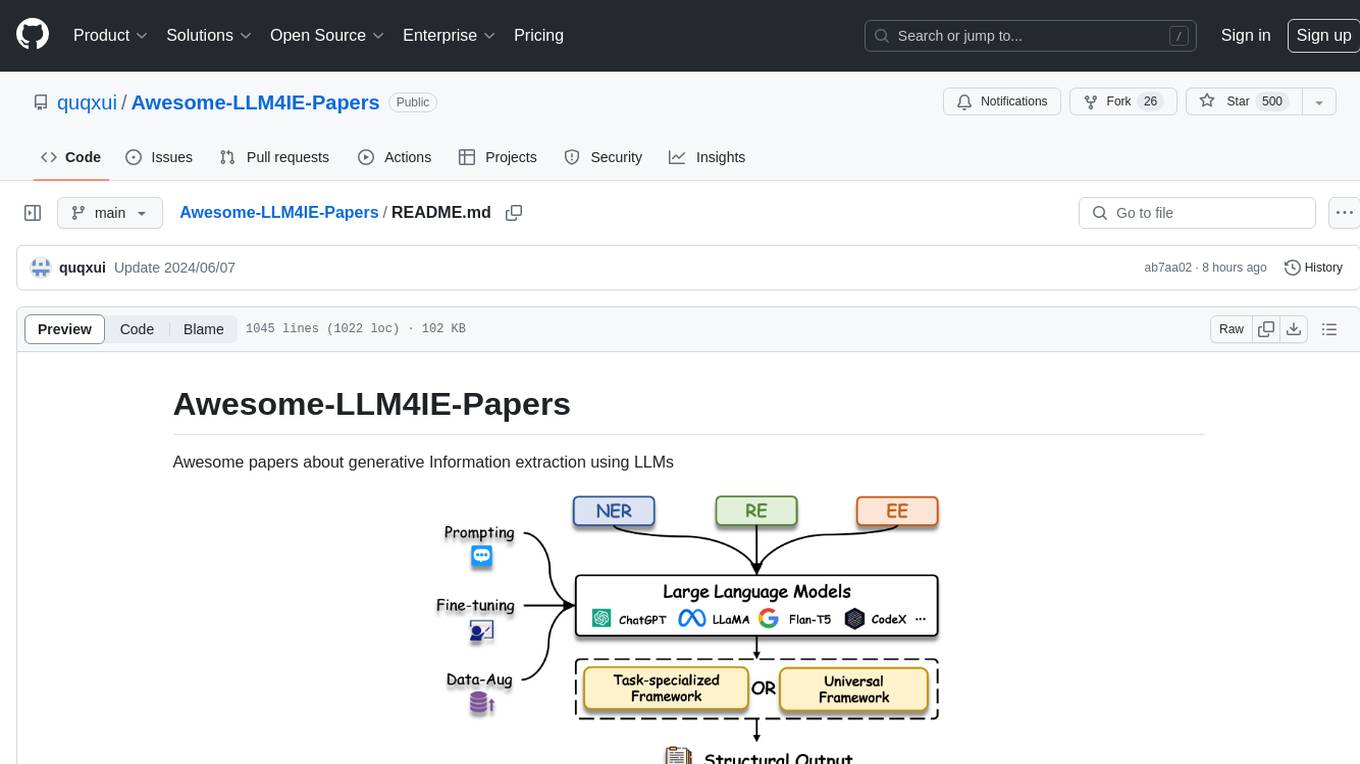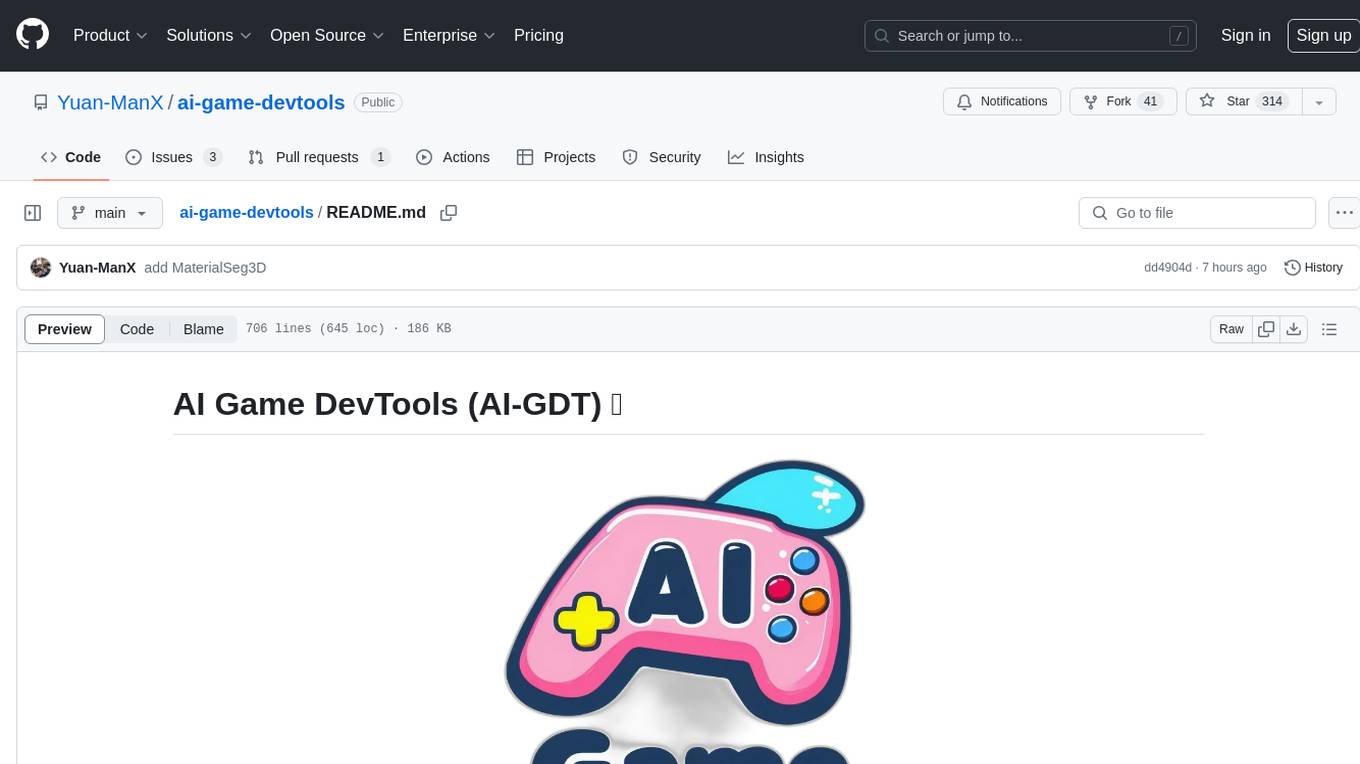
LLM-Agent-Survey
None
Stars: 2250
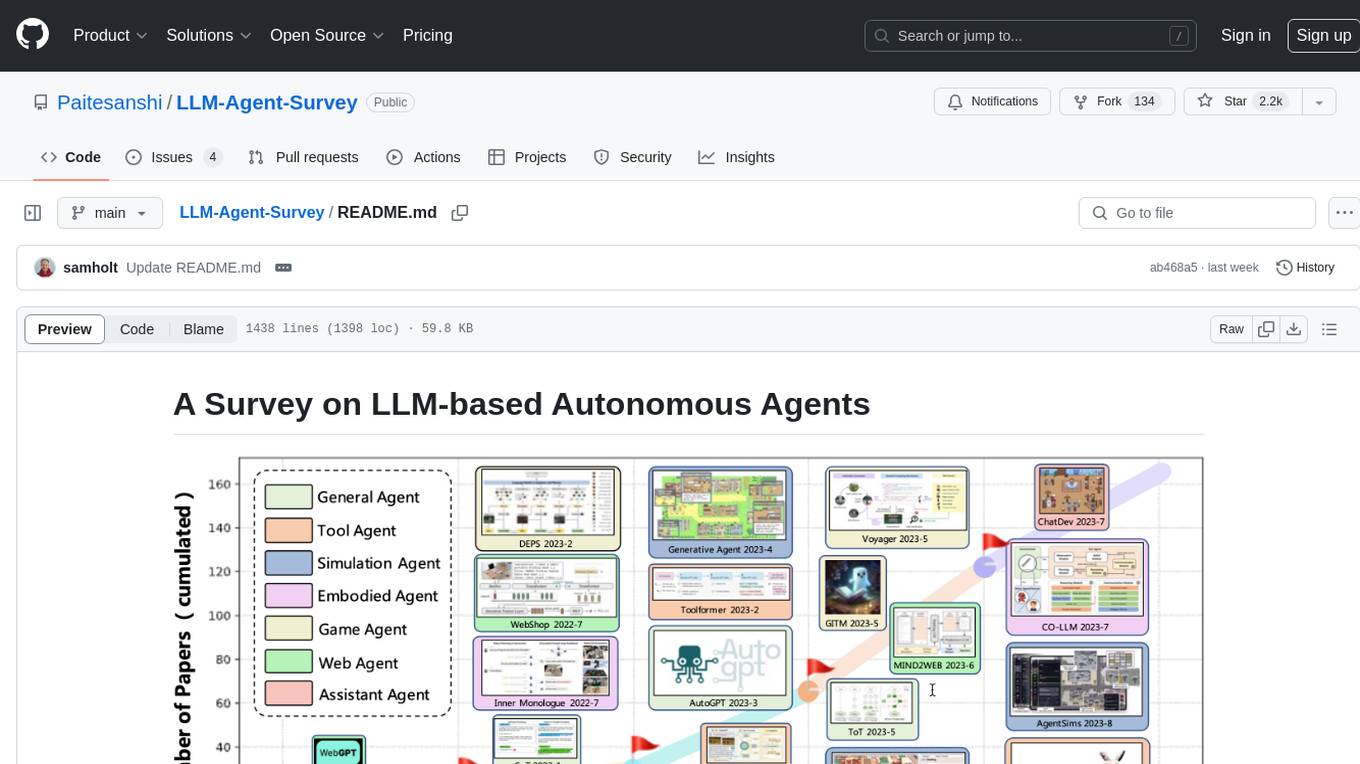
Autonomous agents are designed to achieve specific objectives through self-guided instructions. With the emergence and growth of large language models (LLMs), there is a growing trend in utilizing LLMs as fundamental controllers for these autonomous agents. This repository conducts a comprehensive survey study on the construction, application, and evaluation of LLM-based autonomous agents. It explores essential components of AI agents, application domains in natural sciences, social sciences, and engineering, and evaluation strategies. The survey aims to be a resource for researchers and practitioners in this rapidly evolving field.
README:
Autonomous agents are designed to achieve specific objectives through self-guided instructions. With the emergence and growth of large language models (LLMs), there is a growing trend in utilizing LLMs as fundamental controllers for these autonomous agents. While previous studies in this field have achieved remarkable successes, they remain independent proposals with little effort devoted to a systematic analysis. To bridge this gap, we conduct a comprehensive survey study, focusing on the construction, application, and evaluation of LLM-based autonomous agents. In particular, we first explore the essential components of an AI agent, including a profile module, a memory module, a planning module, and an action module. We further investigate the application of LLM-based autonomous agents in the domains of natural sciences, social sciences, and engineering. Subsequently, we delve into a discussion of the evaluation strategies employed in this field, encompassing both subjective and objective methods. Our survey aims to serve as a resource for researchers and practitioners, providing insights, related references, and continuous updates on this exciting and rapidly evolving field.
📍 This is the first released and published survey paper in the field of LLM-based autonomous agents.
Paper link: A Survey on Large Language Model based Autonomous Agents
-
🔥 [25/3/2024] Our survey paper has been accepted by Frontiers of Computer Science, which is the first published survey paper in the field of LLM-based agents.
-
🔥 [9/28/2023] We have compiled and summarized papers related to LLM-based Agents that have been accepted by Neurips 2023 in the repository LLM-Agent-Paper-Digest. This repository will continue to be updated with accepted agent-related papers in the future.
-
🔥 [9/8/2023] The second version of our survey has been released on arXiv.
Updated contents
-
📚 Additional References
- We have added 31 new works until 9/1/2023 to make the survey more comprehensive and up-to-date.
-
📊 New Figures
-
Figure 3: This is a new figure illustrating the differences and similarities between various planning approaches. This helps in gaining a clearer understanding of the comparisons between different planning methods.

-
Figure 4: This is a new figure that describes the evolutionary path of model capability acquisition from the "Machine Learning era" to the "Large Language Model era" and then to the "Agent era." Specifically, a new concept, "mechanism engineering," has been introduced, which, along with "parameter learning" and "prompt engineering," forms part of this evolutionary path.

-
Figure 3: This is a new figure illustrating the differences and similarities between various planning approaches. This helps in gaining a clearer understanding of the comparisons between different planning methods.
-
🔍 Optimized Classification System
- We have slightly modified the classification system in our survey to make it more logical and organized.
-
-
🔥 [8/23/2023] The first version of our survey has been released on arXiv.
- 🤖 Construction of LLM-based Autonomous Agent
- 📍 Applications of LLM-based Autonomous Agent
- 📊 Evaluation on LLM-based Autonomous Agent
- 🌐 More Comprehensive Summarization
- 👨👨👧👦 Maintainers
- 📚 Citation
- 💪 How to Contribute
- 🫡 Acknowledgement
- 📧 Contact Us
| Model | Profile | Memory | Planning | Action | CA | Paper | Code | |
| Operation | Structure | |||||||
| WebGPT | - | - | - | - | w/ tools | w/ fine-tuning | Paper | - |
| SayCan | - | - | - | w/o feedback | w/o tools | w/o fine-tuning | Paper | Code |
| MRKL | - | - | - | w/o feedback | w/ tools | - | Paper | - |
| Inner Monologue | - | - | - | w/ feedback | w/o tools | w/o fine-tuning | Paper | Code |
| Social Simulacra | GPT-Generated | - | - | - | w/o tools | - | Paper | - |
| ReAct | - | - | - | w/ feedback | w/ tools | w/ fine-tuning | Paper | Code |
| LLM Planner | - | - | - | w/ feedback | w/o tools | Environment feedback | Paper | Code |
| MALLM | - | Read/Write | Hybrid | - | w/o tools | - | Paper | - |
| aiflows | - | Read/Write/ Reflection |
Hybrid | w/ feedback | w/ tools | - | Paper | Code |
| DEPS | - | - | - | w/ feedback | w/o tools | w/o fine-tuning | Paper | Code |
| Toolformer | - | - | - | w/o feedback | w/ tools | w/ fine-tuning | Paper | Code |
| Reflexion | - | Read/Write/ Reflection |
Hybrid | w/ feedback | w/o tools | w/o fine-tuning | Paper | Code |
| CAMEL | Handcrafting & GPT-Generated | - | - | w/ feedback | w/o tools | - | Paper | Code |
| API-Bank | - | - | - | w/ feedback | w/ tools | w/o fine-tuning | Paper | - |
| Chameleon | - | - | - | w/o feedback | w/ tools | - | Paper | Code |
| ViperGPT | - | - | - | - | w/ tools | - | Paper | Code |
| HuggingGPT | - | - | Unified | w/o feedback | w/ tools | - | Paper | Code |
| Generative Agents | Handcrafting | Read/Write/ Reflection |
Hybrid | w/ feedback | w/o tools | - | Paper | Code |
| LLM+P | - | - | - | w/o feedback | w/o tools | - | Paper | - |
| ChemCrow | - | - | - | w/ feedback | w/ tools | - | Paper | Code |
| OpenAGI | - | - | - | w/ feedback | w/ tools | w/ fine-tuning | Paper | Code |
| AutoGPT | - | Read/Write | Hybrid | w/ feedback | w/ tools | w/o fine-tuning | - | Code |
| SCM | - | Read/Write | Hybrid | - | w/o tools | - | Paper | Code |
| Socially Alignment | - | Read/Write | Hybrid | - | w/o tools | Example | Paper | Code |
| GITM | - | Read/Write/ Reflection |
Hybrid | w/ feedback | w/o tools | w/ fine-tuning | Paper | Code |
| Voyager | - | Read/Write/ Reflection |
Hybrid | w/ feedback | w/o tools | w/o fine-tuning | Paper | Code |
| Introspective Tips | - | - | - | w/ feedback | w/o tools | w/o fine-tuning | Paper | - |
| RET-LLM | - | Read/Write | Hybrid | - | w/o tools | w/ fine-tuning | Paper | - |
| ChatDB | - | Read/Write | Hybrid | w/ feedback | w/ tools | - | Paper | - |
| S3 | Dataset alignment | Read/Write/ Reflection |
Hybrid | - | w/o tools | w/ fine-tuning | Paper | - |
| ChatDev | Handcrafting | Read/Write/ Reflection |
Hybrid | w/ feedback | w/o tools | w/o fine-tuning | Paper | Code |
| ToolLLM | - | - | - | w/ feedback | w/ tools | w/ fine-tuning | Paper | Code |
| MemoryBank | - | Read/Write/ Reflection |
Hybrid | - | w/o tools | - | Paper | Code |
| MetaGPT | Handcrafting | Read/Write/ Reflection |
Hybrid | w/ feedback | w/ tools | - | Paper | Code |
| L2MAC | Handcrafting | Read/Write/ Reflection |
Hybrid | w/ feedback | w/ tools | - | Paper | Code |
| LEO | - | - | - | w/ feedback | w/o tools | w/ fine-tuning | Paper | Code |
| JARVIS-1 | - | Read/Write/ Reflection |
Hybrid | w/ feedback | w/ tools | w/o fine-tuning | Paper | Code |
| CLOVA | - | Read/Write/ Reflection |
Hybrid | w/ feedback | w/ tools | w/ fine-tuning | Paper | Code |
| LearnAct | - | - | - | w/ feedback | w/ tools | w/ fine-tuning | Paper | Code |
- More papers can be found at More comprehensive Summarization.
- CA means the strategy of model capability acquisition.
| Title | Social Science | Natural Science | Engineering | Paper | Code | |
| Drori et al. | - | Science Education | - | Paper | - | |
| SayCan | - | - | Robotics & Embodied AI | Paper | Code | |
| Inner monologue | - | - | Robotics & Embodied AI | Paper | Code | |
| Language-Planners | - | - | Robotics & Embodied AI | Paper | Code | |
| Social Simulacra | Social Simulation | - | - | Paper | - | |
| TE | Psychology | - | - | Paper | Code | |
| Out of One | Political Science and Economy | - | - | Paper | - | |
| LIBRO | CS&SE | - | - | Paper | - | |
| Blind Judgement | Jurisprudence | - | - | Paper | - | |
| Horton | Political Science and Economy | - | - | Paper | - | |
| DECKARD | - | - | Robotics & Embodied AI | Paper | Code | |
| Planner-Actor-Reporter | - | - | Robotics & Embodied AI | Paper | - | |
| DEPS | - | - | Robotics & Embodied AI | Paper | - | |
| RCI | - | - | CS&SE | Paper | Code | |
| Generative Agents | Social Simulation | - | - | Paper | Code | |
| SCG | - | - | CS&SE | Paper | - | |
| IGLU | - | - | Civil Engineering | Paper | - | |
| IELLM | - | - | Industrial Automation | Paper | - | |
| ChemCrow | - | Document and Data Management; Documentation, Data Managent; Science Education |
- | Paper | - | |
| Boiko et al. | - | Document and Data Management; Documentation, Data Managent; Science Education |
- | Paper | - | |
| GPT4IA | - | - | Industrial Automation | Paper | Code | |
| Self-collaboration | - | - | CS&SE | Paper | - | |
| E2WM | - | - | Robotics & Embodied AI | Paper | Code | |
| Akata et al. | Psychology | - | - | Paper | - | |
| Ziems et al. | Psychology; Political Science and Economy; Research Assistant |
- | - | Paper | - | |
| AgentVerse | Social Simulation | - | - | Paper | Code | |
| SmolModels | - | - | CS&SE | - | Code | |
| TidyBot | - | - | Robotics & Embodied AI | Paper | Code | |
| PET | - | - | Robotics & Embodied AI | Paper | - | |
| Voyager | - | - | Robotics & Embodied AI | Paper | Code | |
| GITM | - | - | Robotics & Embodied AI | Paper | Code | |
| NLSOM | - | Science Education | - | Paper | - | |
| LLM4RL | - | - | Robotics & Embodied AI | Paper | - | |
| GPT Engineer | - | - | CS&SE | - | Code | |
| Grossman et al. | - | Experiment Assistant; Science Education |
- | Paper | - | |
| SQL-PALM | - | - | CS&SE | Paper | - | |
| REMEMBER | - | - | Robotics & Embodied AI | Paper | - | |
| DemoGPT | - | - | CS&SE | - | Code | |
| Chatlaw | Jurisprudence | - | - | Paper | Code | |
| RestGPT | - | - | CS&SE | Paper | Code | |
| Dialogue shaping | - | - | Robotics & Embodied AI | Paper | - | |
| TaPA | - | - | Robotics & Embodied AI | Paper | - | |
| Ma et al. | Psychology | - | - | Paper | - | |
| Math Agents | - | Science Education | - | Paper | - | |
| SocialAI School | Social Simulation | - | - | Paper | - | |
| Unified Agent | - | - | Robotics & Embodied AI | Paper | - | |
| Wiliams et al. | Social Simulation | - | - | Paper | - | |
| Li et al. | Social Simulation | - | - | Paper | - | |
| S3 | Social Simulation | - | - | Paper | - | |
| Dialogue Shaping | - | - | Robotics & Embodied AI | Paper | - | |
| RoCo | - | - | Robotics & Embodied AI | Paper | Code | |
| Sayplan | - | - | Robotics & Embodied AI | Paper | Code | |
| aiflows | - | - | CS & SE | Paper | Code | |
| ToolLLM | - | - | CS&SE | Paper | Code | |
| ChatDEV | - | - | CS&SE | Paper | - | |
| Chao et al. | Social Simulation | - | - | Paper | - | |
| AgentSims | Social Simulation | - | - | Paper | Code | |
| ChatMOF | - | Document and Data Management; Science Education |
- | Paper | - | |
| MetaGPT | - | - | CS&SE | Paper | Code | |
| L2MAC | - | - | CS&SE | Paper | Code | |
| Codehelp | - | Science Education | CS&SE | Paper | - | |
| AutoGen | - | Science Education | - | Paper | - | |
| RAH | - | - | CS&SE | Paper | - | |
| DB-GPT | - | - | CS&SE | Paper | Code | |
| RecMind | - | - | CS&SE | Paper | - | |
| ChatEDA | - | - | CS&SE | Paper | - | |
| InteRecAgent | - | - | CS&SE | Paper | - | |
| PentestGPT | - | - | CS&SE | Paper | - | |
| Codehelp | - | - | CS&SE | Paper | - | |
| ProAgent | - | - | Robotics & Embodied AI | Paper | - | |
| MindAgent | - | - | Robotics & Embodied AI | Paper | - | |
| LEO | - | - | Robotics & Embodied AI | Paper | - | |
| JARVIS-1 | - | - | Robotics & Embodied AI | Paper | - | |
| CLOVA | - | - | CS&SE | Paper | - | |
| AgentTrust | - | Social Simulation | ✓ | Paper | Code | - |
- More papers can be found at More comprehensive Summarization.
| Model | Subjective | Objective | Benchmark | Paper | Code | |
| WebShop | - | Environment Simulation; Multi-task Evaluation |
✓ | Paper | Code | |
| Social Simulacra | Human Annotation | Social Evaluation | - | Paper | - | |
| TE | - | Social Evaluation | - | Paper | Code | |
| LIBRO | - | Software Testing | - | Paper | - | |
| ReAct | - | Environment Simulation | ✓ | Paper | Code | |
| Out of One, Many | Turing Test | Social Evaluation; Multi-task Evaluation |
- | Paper | - | |
| DEPS | - | Environment Simulation | ✓ | Paper | - | |
| Jalil et al. | - | Software Testing | - | Paper | Code | |
| Reflexion | - | Environment Simulation; Multi-task Evaluation |
- | Paper | Code | |
| IGLU | - | Environment Simulation | ✓ | Paper | - | |
| Generative Agents | Human Annoation; Turing Test |
- | - | Paper | Code | |
| ToolBench | Human Annoation | Multi-task Evalution | ✓ | Paper | Code | |
| GITM | - | Environment Simulation | ✓ | Paper | Code | |
| Two-Failures | - | Multi-task Evalution | - | Paper | - | |
| Voyager | - | Environment Simulation | ✓ | Paper | Code | |
| SocKET | - | Social Evaluation; Multi-task Evaluation |
✓ | Paper | - | |
| Mobile-Env | - | Environment Simulation; Multi-task Evaluation |
✓ | Paper | Code | |
| Clembench | - | Environment Simulation; Multi-task Evaluation |
✓ | Paper | Code | |
| Mind2Web | - | Environment Simulation; Multi-task Evaluation |
✓ | 06/2023 | Paper | Code |
| Dialop | - | Social Evaluation | ✓ | Paper | Code | |
| Feldt et al. | - | Software Testing | - | Paper | - | |
| CO-LLM | Human Annoation | Environment Simulation | - | Paper | Code | |
| Tachikuma | Human Annoation | Environment Simulation | ✓ | Paper | - | |
| WebArena | - | Environment Simulation | ✓ | Paper | Code | |
| RocoBench | - | Environment Simulation; Social Evaluation; Multi-task Evaluation |
✓ | Paper | Code | |
| AgentSims | - | Social Evaluation | - | Paper | Code | |
| AgentBench | - | Multi-task Evaluation | ✓ | Paper | Code | |
| BOLAA | - | Environment Simulation; Multi-task Evaluation; Software Testing |
✓ | Paper | Code | |
| Gentopia | - | Isolated Reasoning; Multi-task Evaluation |
✓ | Paper | Code | |
| EmotionBench | Human Annotation | - | ✓ | Paper | Code | |
| PTB | - | Software Testing | ✓ | Paper | - | |
| MintBench | - | Multi-task Evaluation | ✓ | Paper | Code | |
| MindAgent | - | Environment Simulation; Multi-task Evaluation |
✓ | Paper | - | |
| JARVIS-1 | - | Environment Simulation | - | Paper | - |
- More papers can be found at More comprehensive Summarization.
We are maintaining an interactive table that contains more comprehensive papers related to LLM-based Agents. This table includes details such as tags, authors, publication date, and more, allowing you to sort, filter, and find the papers of interest to you.

- Lei Wang@Paitesanshi
- Chen Ma@Uily
- Xueyang Feng@XueyangFeng
If you find this survey useful, please cite our paper:
@misc{wang2023survey,
title={A Survey on Large Language Model based Autonomous Agents},
author={Lei Wang and Chen Ma and Xueyang Feng and Zeyu Zhang and Hao Yang and Jingsen Zhang and Zhiyuan Chen and Jiakai Tang and Xu Chen and Yankai Lin and Wayne Xin Zhao and Zhewei Wei and Ji-Rong Wen},
year={2023},
eprint={2308.11432},
archivePrefix={arXiv},
primaryClass={cs.AI}
}
If you have a paper or are aware of relevant research that should be incorporated, please contribute via pull requests, issues, email, or other suitable methods.
We thank the following people for their valuable suggestions and contributions to this survey:
- Yifan Song@Yifan-Song793
- Qichen Zhao@Andrewzh112
- Ikko E. Ashimine@eltociear
If you have any questions or suggestions, please contact us via:
- Email: [email protected], [email protected]
For Tasks:
Click tags to check more tools for each tasksFor Jobs:
Alternative AI tools for LLM-Agent-Survey
Similar Open Source Tools

LLM-Agent-Survey
Autonomous agents are designed to achieve specific objectives through self-guided instructions. With the emergence and growth of large language models (LLMs), there is a growing trend in utilizing LLMs as fundamental controllers for these autonomous agents. This repository conducts a comprehensive survey study on the construction, application, and evaluation of LLM-based autonomous agents. It explores essential components of AI agents, application domains in natural sciences, social sciences, and engineering, and evaluation strategies. The survey aims to be a resource for researchers and practitioners in this rapidly evolving field.
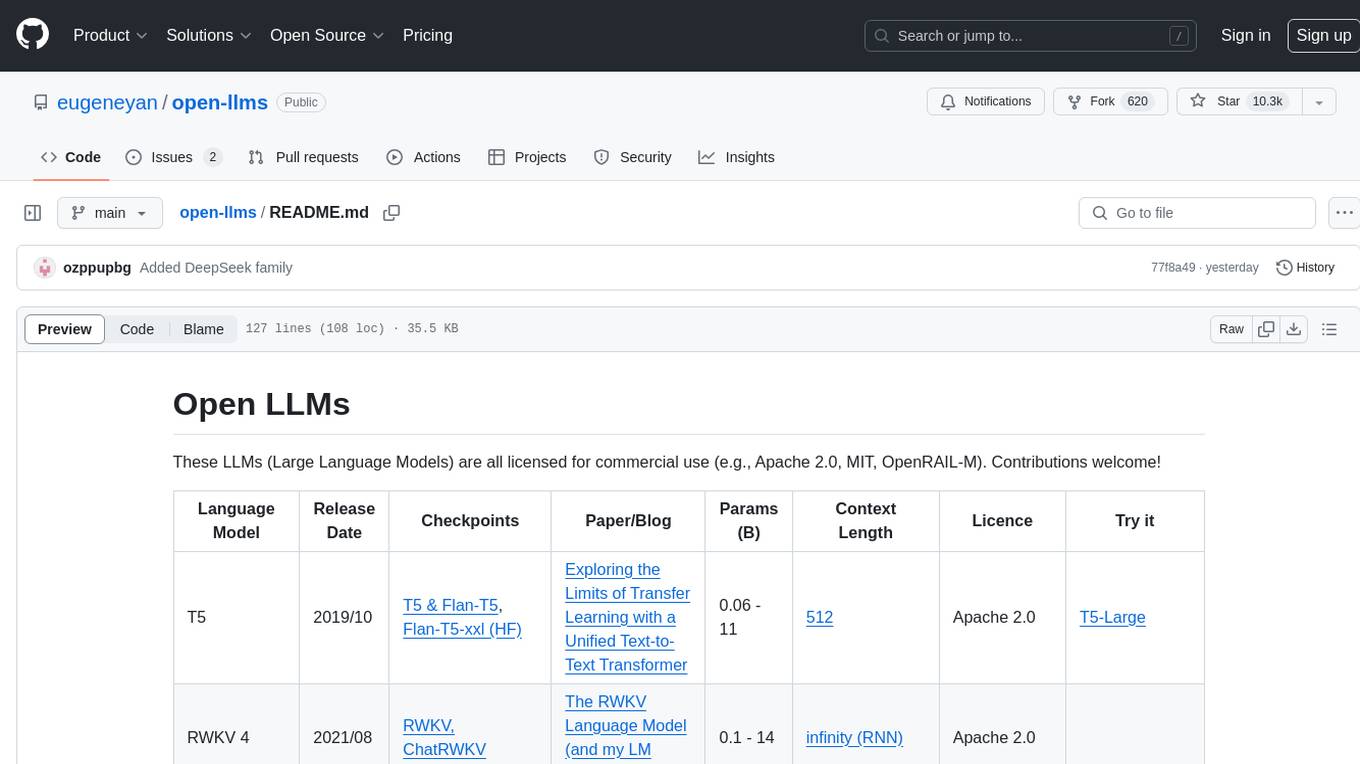
open-llms
Open LLMs is a repository containing various Large Language Models licensed for commercial use. It includes models like T5, GPT-NeoX, UL2, Bloom, Cerebras-GPT, Pythia, Dolly, and more. These models are designed for tasks such as transfer learning, language understanding, chatbot development, code generation, and more. The repository provides information on release dates, checkpoints, papers/blogs, parameters, context length, and licenses for each model. Contributions to the repository are welcome, and it serves as a resource for exploring the capabilities of different language models.
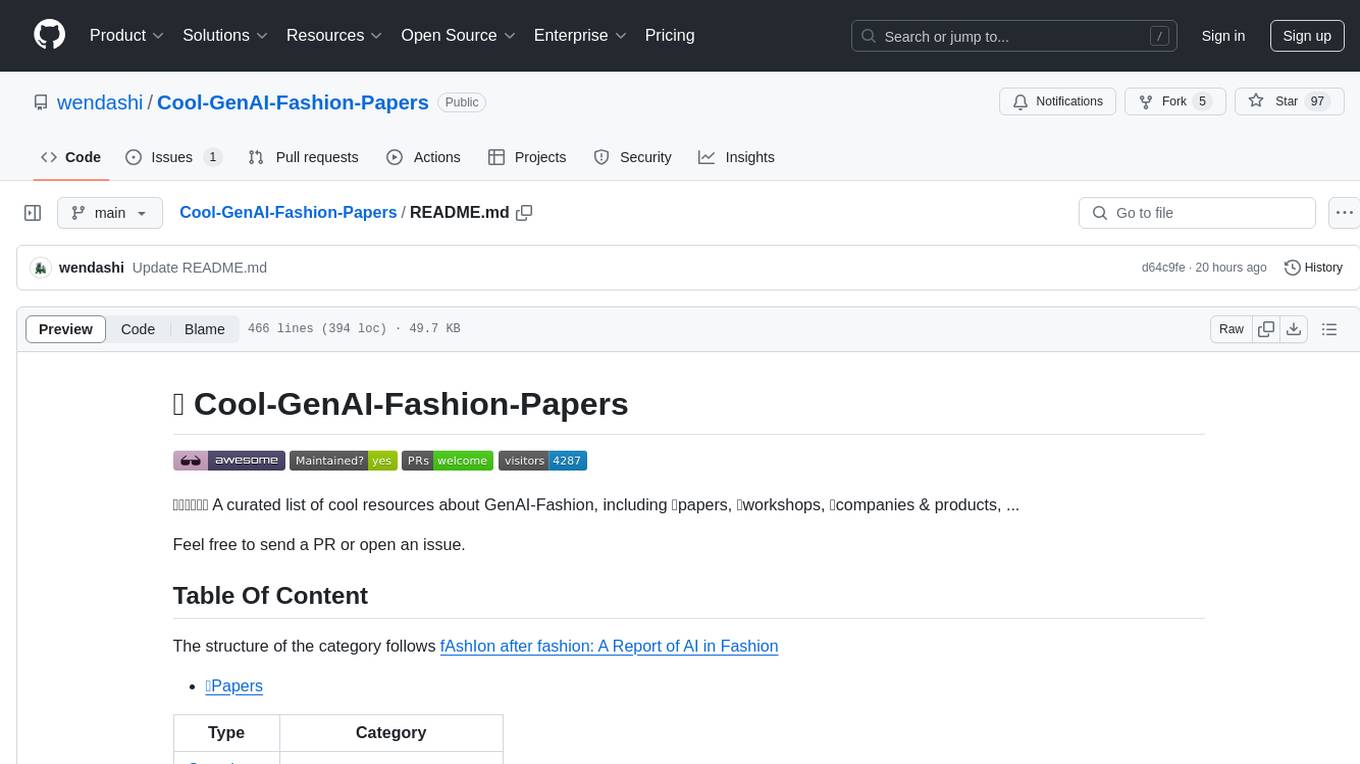
Cool-GenAI-Fashion-Papers
Cool-GenAI-Fashion-Papers is a curated list of resources related to GenAI-Fashion, including papers, workshops, companies, and products. It covers a wide range of topics such as fashion design synthesis, outfit recommendation, fashion knowledge extraction, trend analysis, and more. The repository provides valuable insights and resources for researchers, industry professionals, and enthusiasts interested in the intersection of AI and fashion.
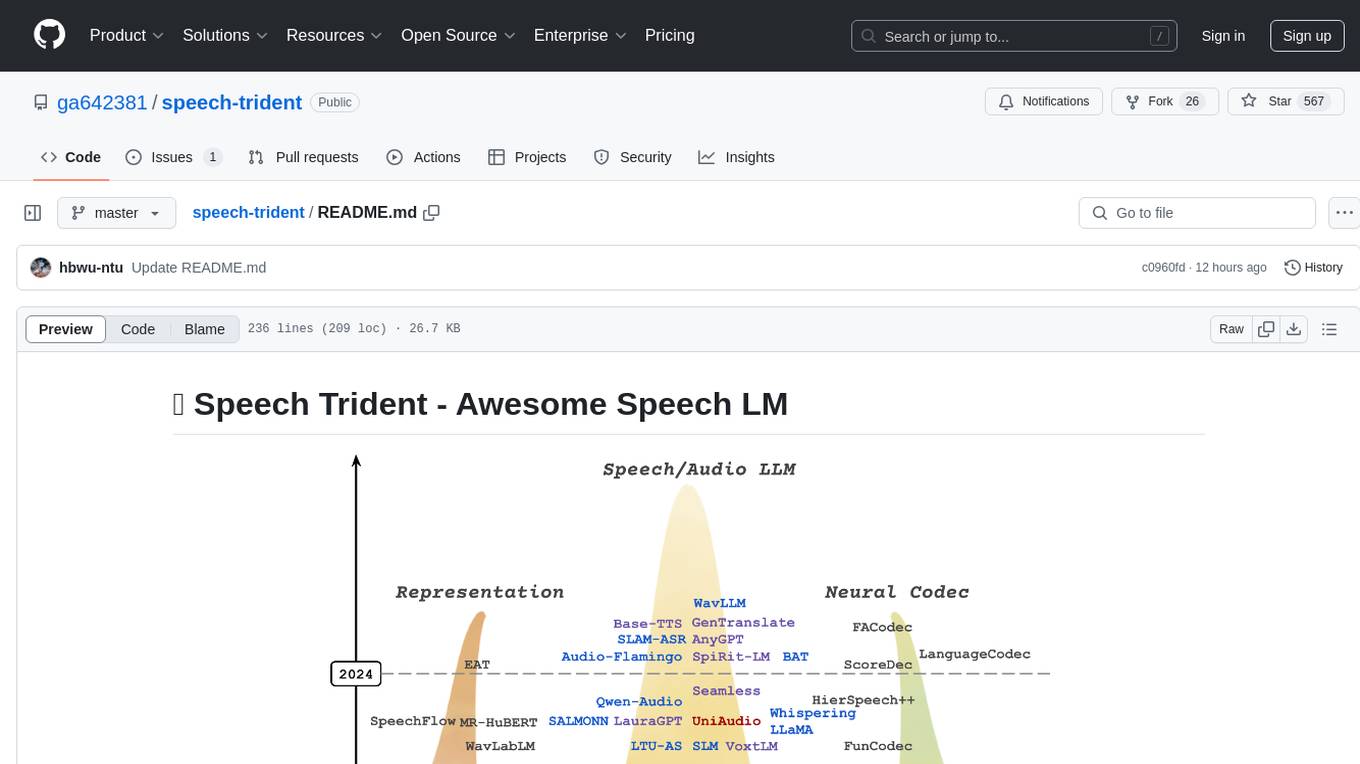
speech-trident
Speech Trident is a repository focusing on speech/audio large language models, covering representation learning, neural codec, and language models. It explores speech representation models, speech neural codec models, and speech large language models. The repository includes contributions from various researchers and provides a comprehensive list of speech/audio language models, representation models, and codec models.
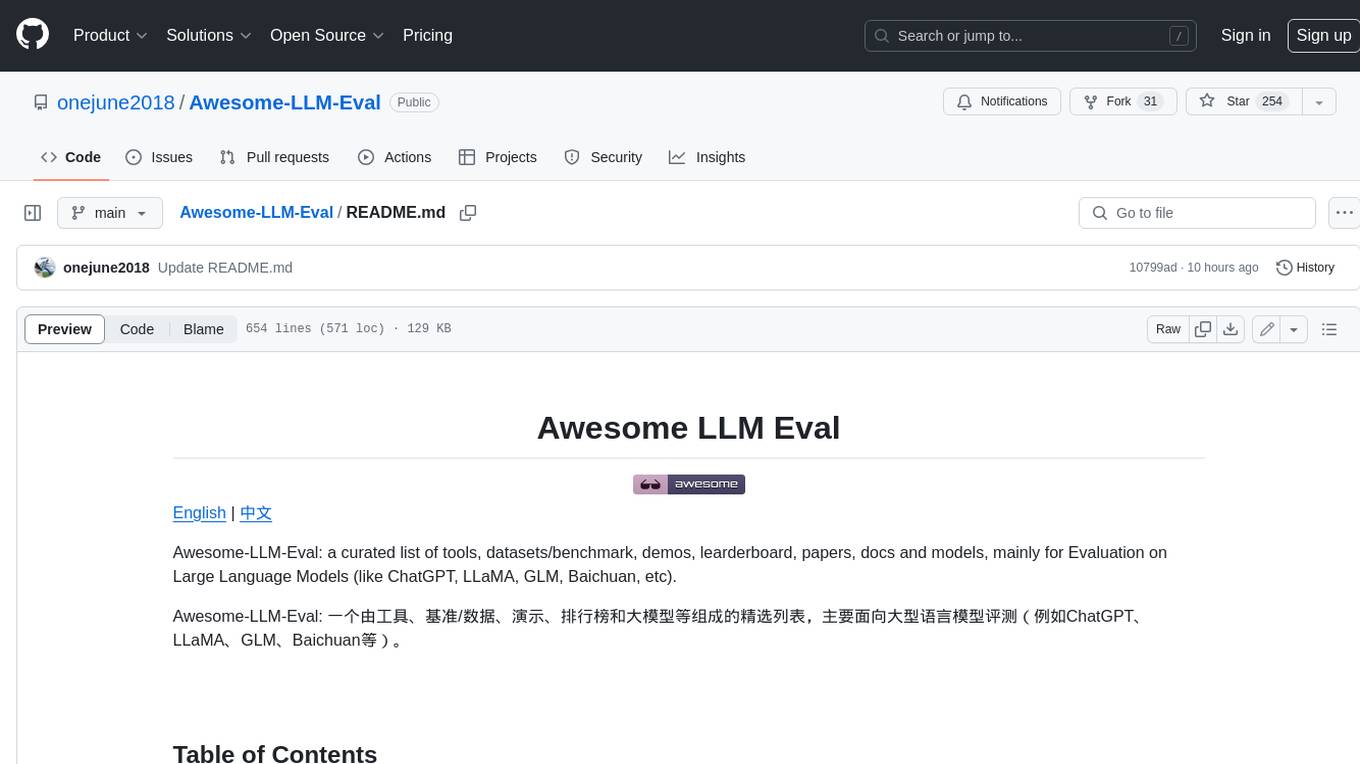
Awesome-LLM-Eval
Awesome-LLM-Eval: a curated list of tools, benchmarks, demos, papers for Large Language Models (like ChatGPT, LLaMA, GLM, Baichuan, etc) Evaluation on Language capabilities, Knowledge, Reasoning, Fairness and Safety.
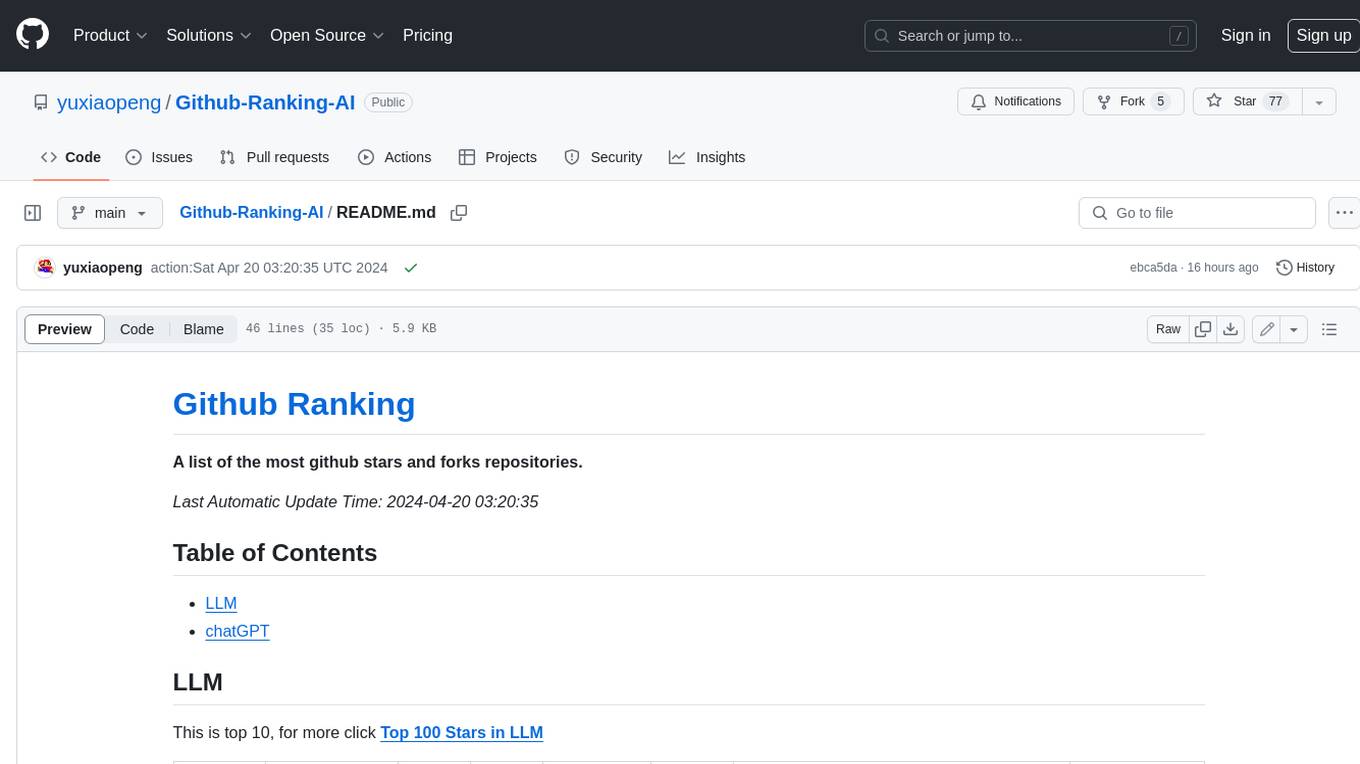
Github-Ranking-AI
This repository provides a list of the most starred and forked repositories on GitHub. It is updated automatically and includes information such as the project name, number of stars, number of forks, language, number of open issues, description, and last commit date. The repository is divided into two sections: LLM and chatGPT. The LLM section includes repositories related to large language models, while the chatGPT section includes repositories related to the chatGPT chatbot.
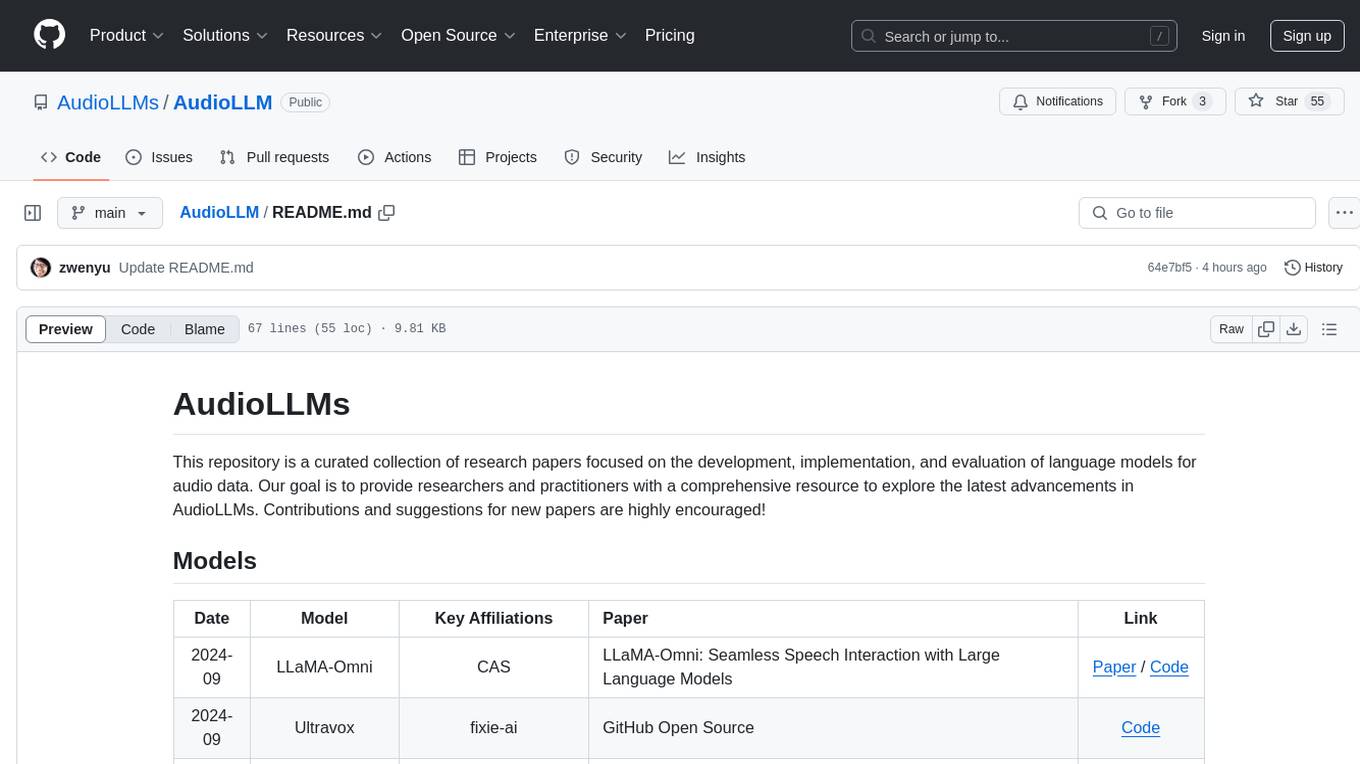
AudioLLM
AudioLLMs is a curated collection of research papers focusing on developing, implementing, and evaluating language models for audio data. The repository aims to provide researchers and practitioners with a comprehensive resource to explore the latest advancements in AudioLLMs. It includes models for speech interaction, speech recognition, speech translation, audio generation, and more. Additionally, it covers methodologies like multitask audioLLMs and segment-level Q-Former, as well as evaluation benchmarks like AudioBench and AIR-Bench. Adversarial attacks such as VoiceJailbreak are also discussed.
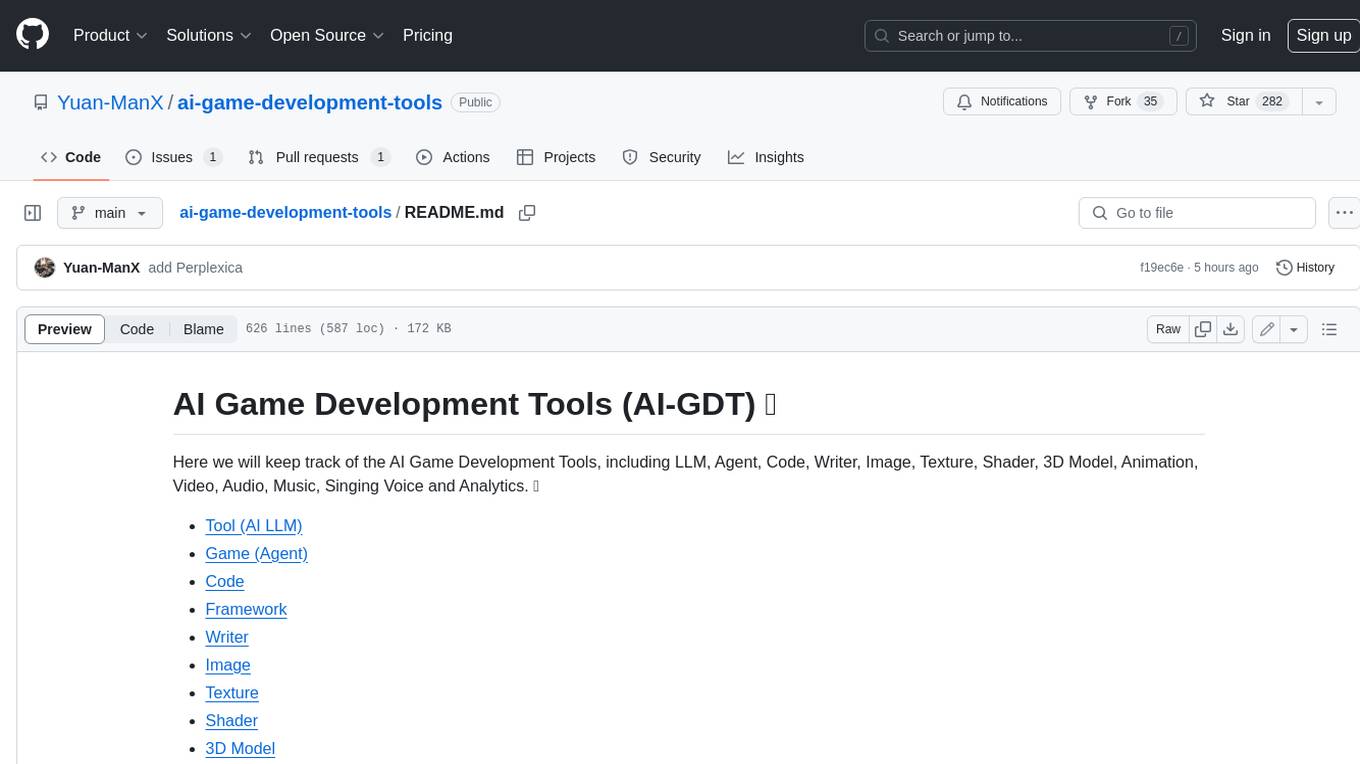
ai-game-development-tools
Here we will keep track of the AI Game Development Tools, including LLM, Agent, Code, Writer, Image, Texture, Shader, 3D Model, Animation, Video, Audio, Music, Singing Voice and Analytics. 🔥 * Tool (AI LLM) * Game (Agent) * Code * Framework * Writer * Image * Texture * Shader * 3D Model * Avatar * Animation * Video * Audio * Music * Singing Voice * Speech * Analytics * Video Tool
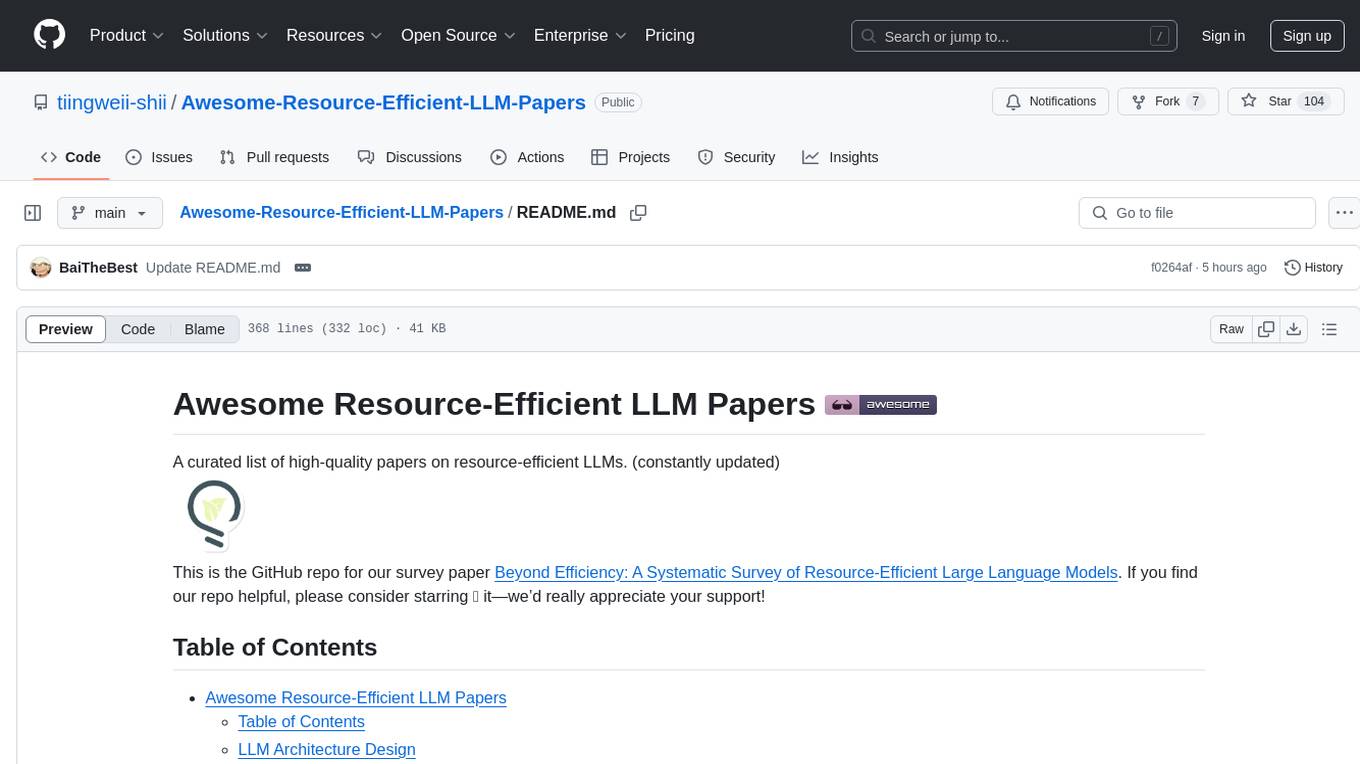
Awesome-Resource-Efficient-LLM-Papers
A curated list of high-quality papers on resource-efficient Large Language Models (LLMs) with a focus on various aspects such as architecture design, pre-training, fine-tuning, inference, system design, and evaluation metrics. The repository covers topics like efficient transformer architectures, non-transformer architectures, memory efficiency, data efficiency, model compression, dynamic acceleration, deployment optimization, support infrastructure, and other related systems. It also provides detailed information on computation metrics, memory metrics, energy metrics, financial cost metrics, network communication metrics, and other metrics relevant to resource-efficient LLMs. The repository includes benchmarks for evaluating the efficiency of NLP models and references for further reading.
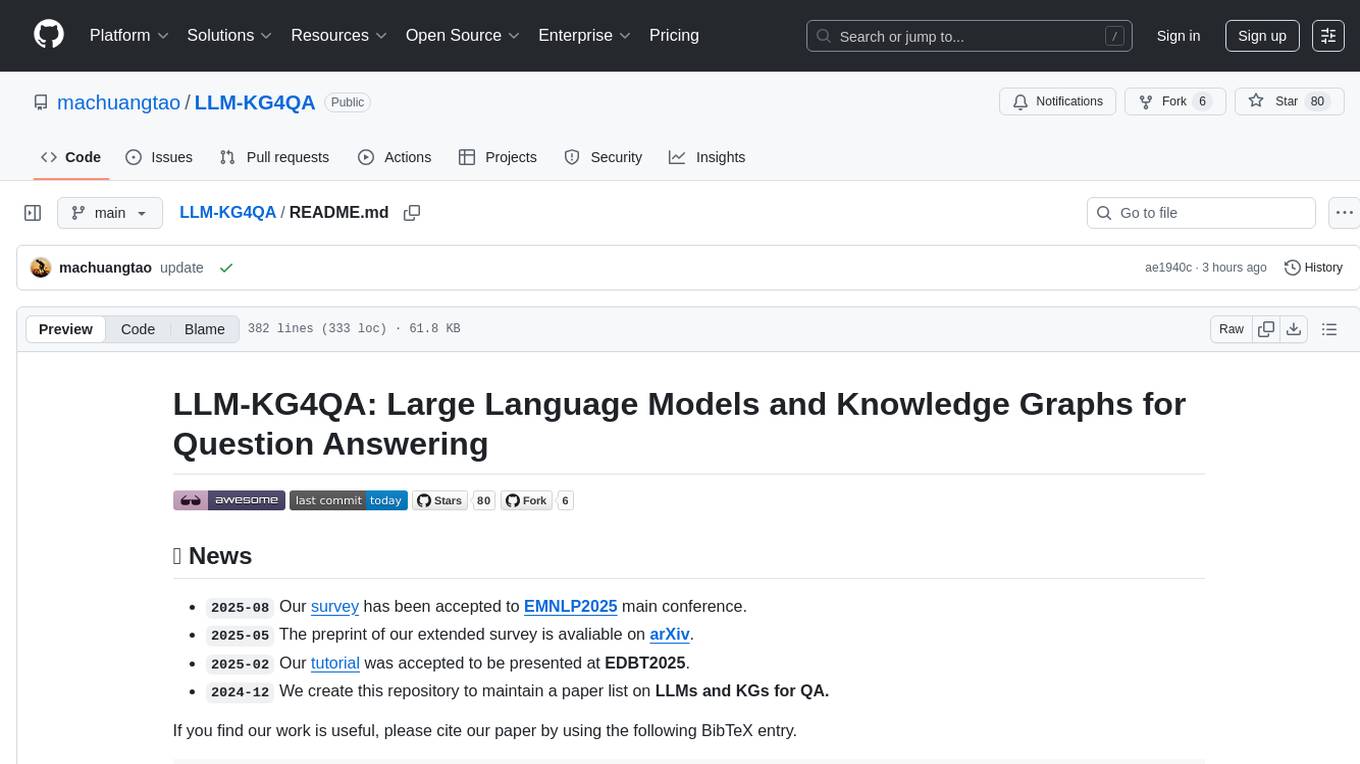
LLM-KG4QA
LLM-KG4QA is a repository focused on the integration of Large Language Models (LLMs) and Knowledge Graphs (KGs) for Question Answering (QA). It covers various aspects such as using KGs as background knowledge, reasoning guideline, and refiner/filter. The repository provides detailed information on pre-training, fine-tuning, and Retrieval Augmented Generation (RAG) techniques for enhancing QA performance. It also explores complex QA tasks like Explainable QA, Multi-Modal QA, Multi-Document QA, Multi-Hop QA, Multi-run and Conversational QA, Temporal QA, Multi-domain and Multilingual QA, along with advanced topics like Optimization and Data Management. Additionally, it includes benchmark datasets, industrial and scientific applications, demos, and related surveys in the field.
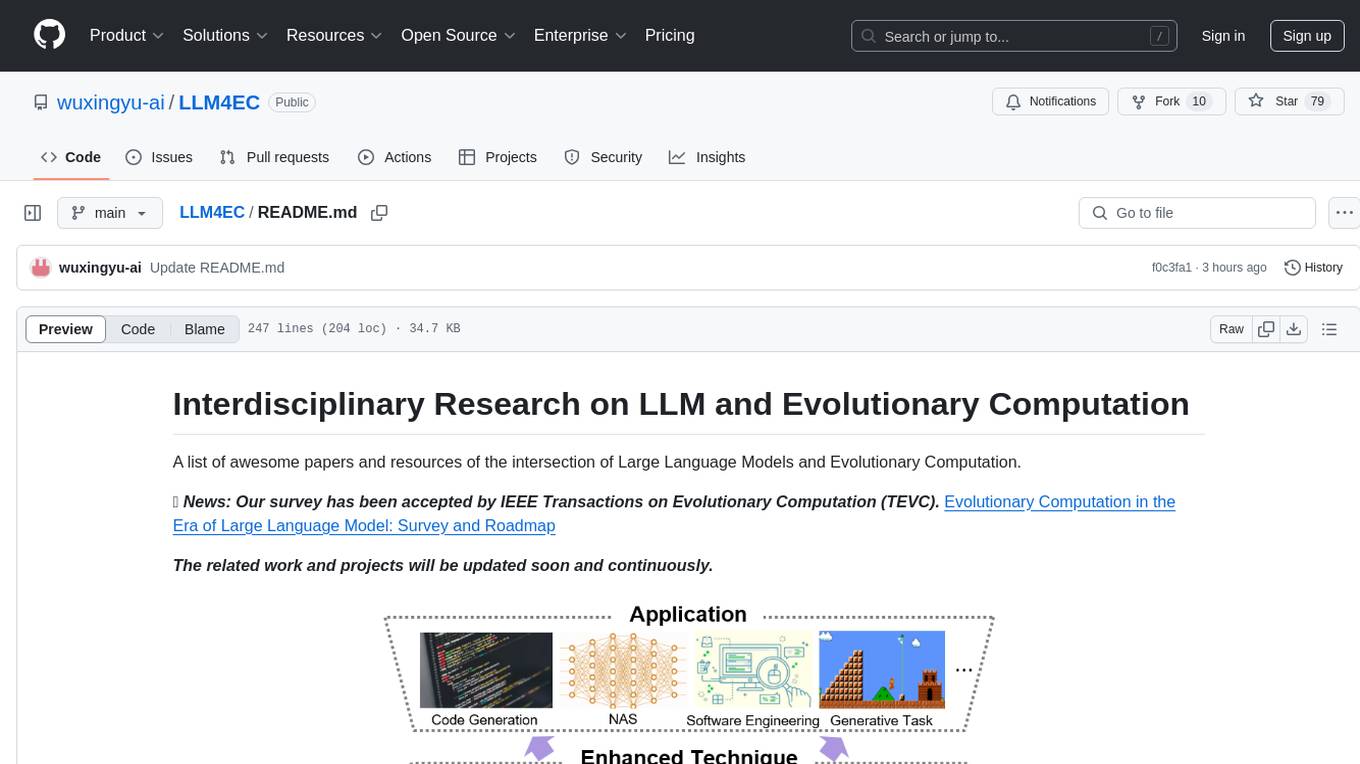
LLM4EC
LLM4EC is an interdisciplinary research repository focusing on the intersection of Large Language Models (LLM) and Evolutionary Computation (EC). It provides a comprehensive collection of papers and resources exploring various applications, enhancements, and synergies between LLM and EC. The repository covers topics such as LLM-assisted optimization, EA-based LLM architecture search, and applications in code generation, software engineering, neural architecture search, and other generative tasks. The goal is to facilitate research and development in leveraging LLM and EC for innovative solutions in diverse domains.
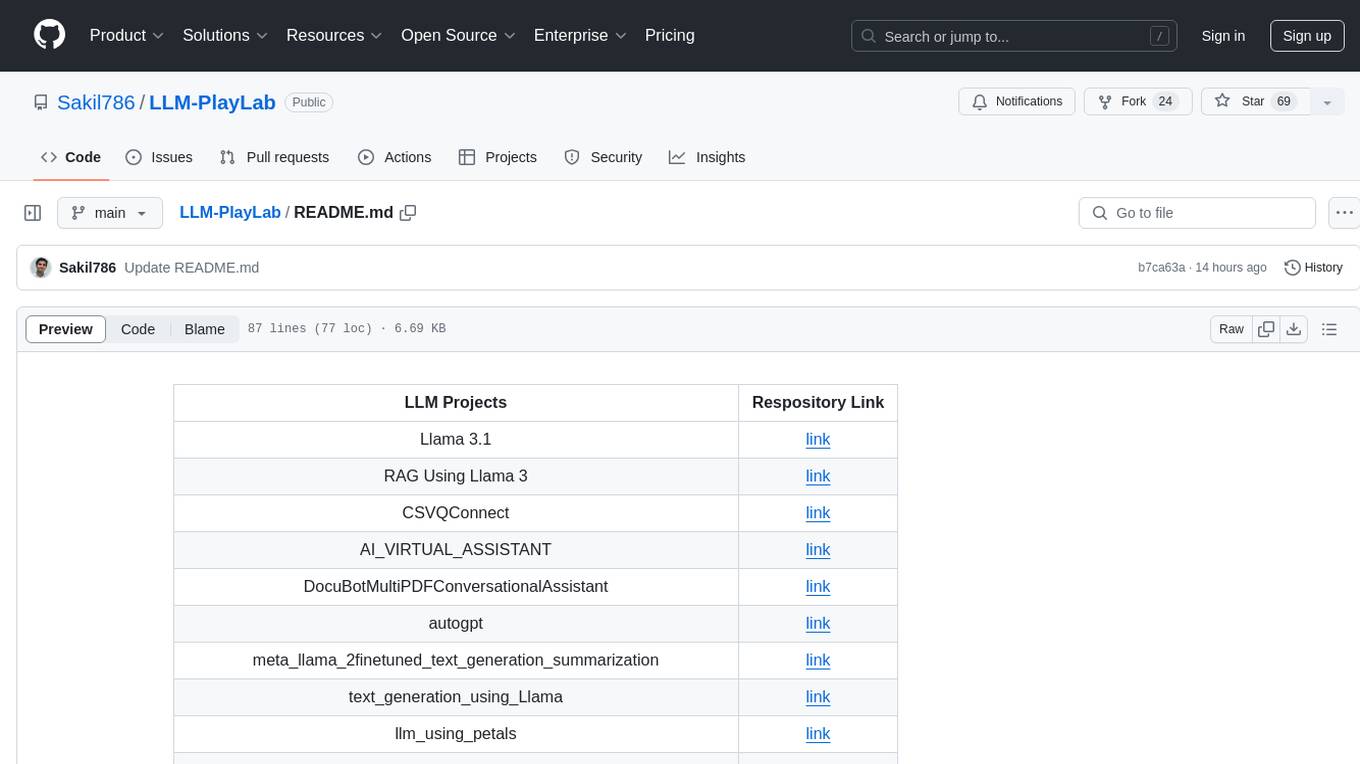
LLM-PlayLab
LLM-PlayLab is a repository containing various projects related to LLM (Large Language Models) fine-tuning, generative AI, time-series forecasting, and crash courses. It includes projects for text generation, sentiment analysis, data analysis, chat assistants, image captioning, and more. The repository offers a wide range of tools and resources for exploring and implementing advanced AI techniques.
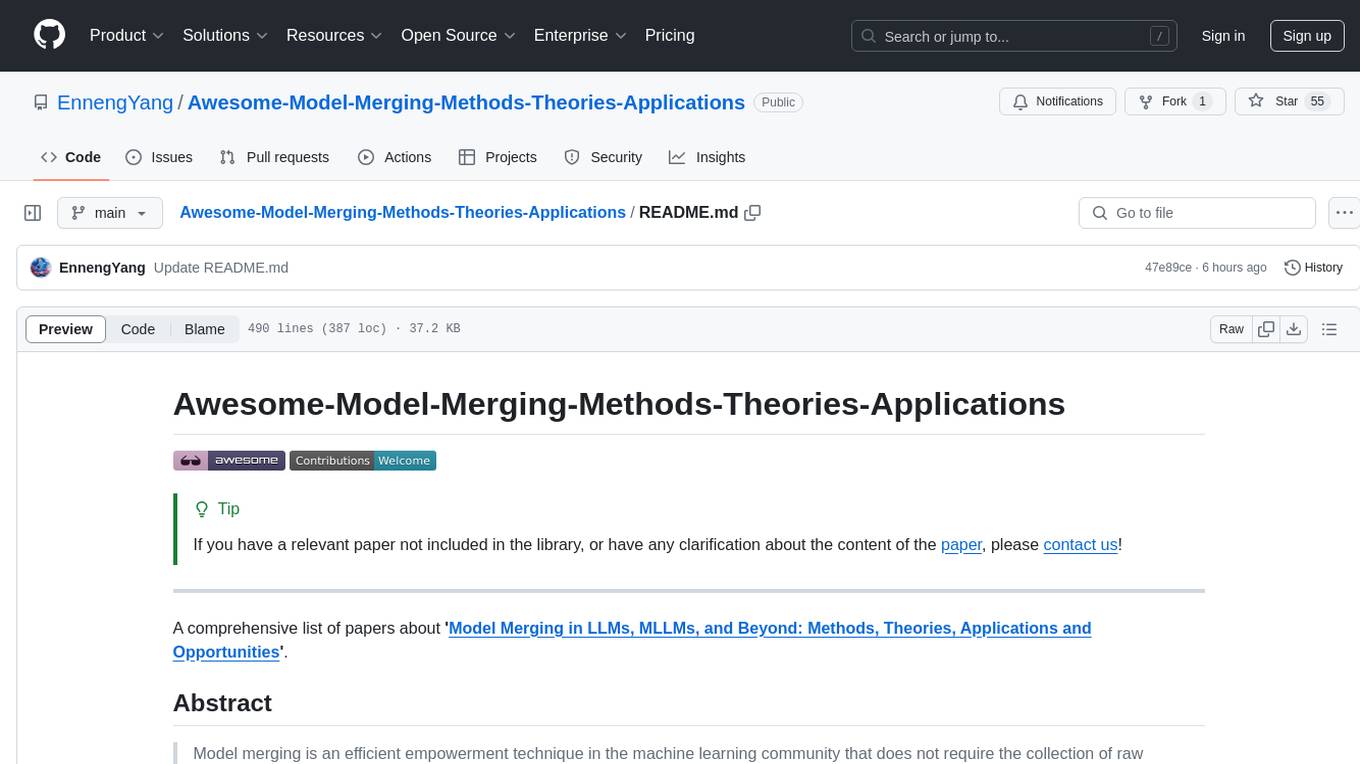
Awesome-Model-Merging-Methods-Theories-Applications
A comprehensive repository focusing on 'Model Merging in LLMs, MLLMs, and Beyond', providing an exhaustive overview of model merging methods, theories, applications, and future research directions. The repository covers various advanced methods, applications in foundation models, different machine learning subfields, and tasks like pre-merging methods, architecture transformation, weight alignment, basic merging methods, and more.
For similar tasks

Azure-Analytics-and-AI-Engagement
The Azure-Analytics-and-AI-Engagement repository provides packaged Industry Scenario DREAM Demos with ARM templates (Containing a demo web application, Power BI reports, Synapse resources, AML Notebooks etc.) that can be deployed in a customer’s subscription using the CAPE tool within a matter of few hours. Partners can also deploy DREAM Demos in their own subscriptions using DPoC.

sorrentum
Sorrentum is an open-source project that aims to combine open-source development, startups, and brilliant students to build machine learning, AI, and Web3 / DeFi protocols geared towards finance and economics. The project provides opportunities for internships, research assistantships, and development grants, as well as the chance to work on cutting-edge problems, learn about startups, write academic papers, and get internships and full-time positions at companies working on Sorrentum applications.

tidb
TiDB is an open-source distributed SQL database that supports Hybrid Transactional and Analytical Processing (HTAP) workloads. It is MySQL compatible and features horizontal scalability, strong consistency, and high availability.

zep-python
Zep is an open-source platform for building and deploying large language model (LLM) applications. It provides a suite of tools and services that make it easy to integrate LLMs into your applications, including chat history memory, embedding, vector search, and data enrichment. Zep is designed to be scalable, reliable, and easy to use, making it a great choice for developers who want to build LLM-powered applications quickly and easily.

telemetry-airflow
This repository codifies the Airflow cluster that is deployed at workflow.telemetry.mozilla.org (behind SSO) and commonly referred to as "WTMO" or simply "Airflow". Some links relevant to users and developers of WTMO: * The `dags` directory in this repository contains some custom DAG definitions * Many of the DAGs registered with WTMO don't live in this repository, but are instead generated from ETL task definitions in bigquery-etl * The Data SRE team maintains a WTMO Developer Guide (behind SSO)

mojo
Mojo is a new programming language that bridges the gap between research and production by combining Python syntax and ecosystem with systems programming and metaprogramming features. Mojo is still young, but it is designed to become a superset of Python over time.

pandas-ai
PandasAI is a Python library that makes it easy to ask questions to your data in natural language. It helps you to explore, clean, and analyze your data using generative AI.

databend
Databend is an open-source cloud data warehouse that serves as a cost-effective alternative to Snowflake. With its focus on fast query execution and data ingestion, it's designed for complex analysis of the world's largest datasets.
For similar jobs

LLM-Agent-Survey
Autonomous agents are designed to achieve specific objectives through self-guided instructions. With the emergence and growth of large language models (LLMs), there is a growing trend in utilizing LLMs as fundamental controllers for these autonomous agents. This repository conducts a comprehensive survey study on the construction, application, and evaluation of LLM-based autonomous agents. It explores essential components of AI agents, application domains in natural sciences, social sciences, and engineering, and evaluation strategies. The survey aims to be a resource for researchers and practitioners in this rapidly evolving field.
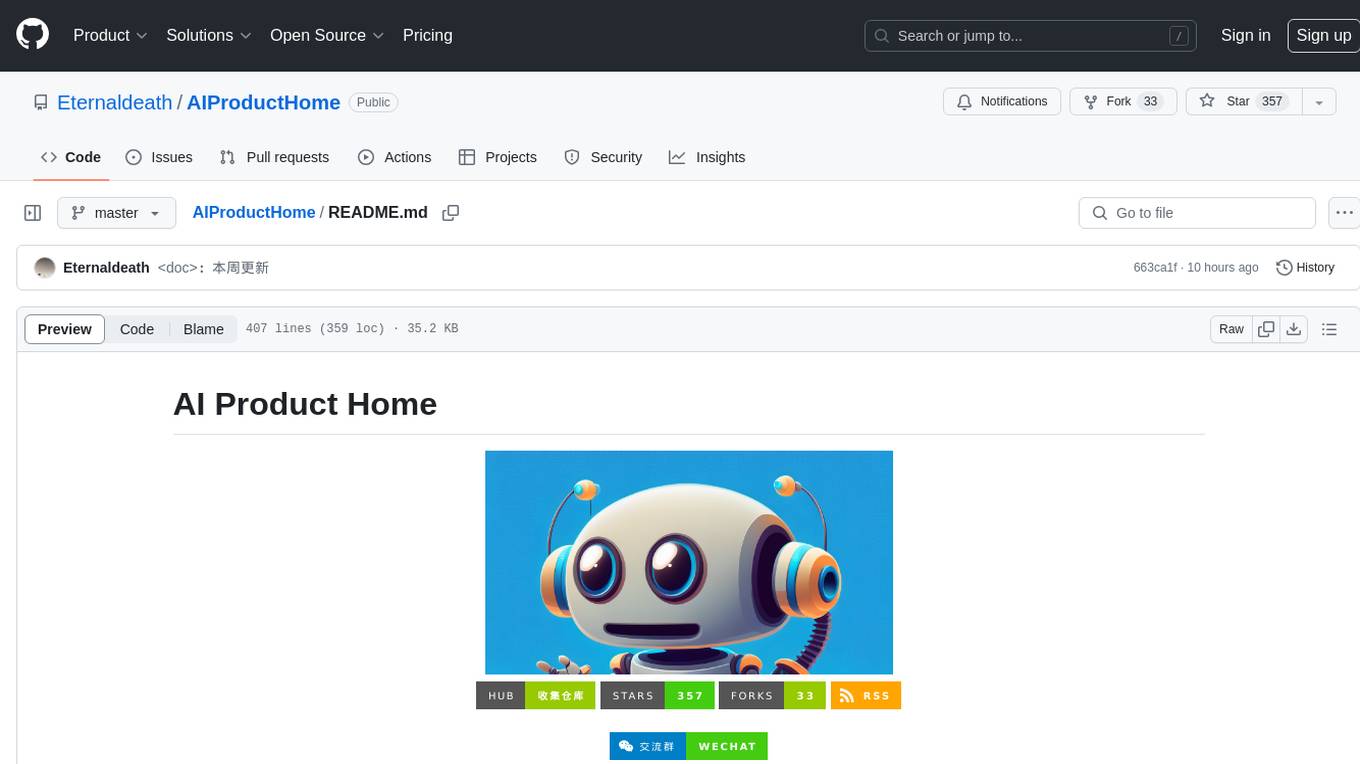
AIProductHome
AI Product Home is a repository dedicated to collecting various AI commercial or open-source products. It provides assistance in submitting issues, self-recommendation, correcting resources, and more. The repository also features AI tools like Build Naidia, Autopod, Rytr, Mubert, and a virtual town driven by AI. It includes sections for AI models, chat dialogues, AI assistants, code assistance, artistic creation, content creation, and more. The repository covers a wide range of AI-related tools and resources for users interested in AI products and services.
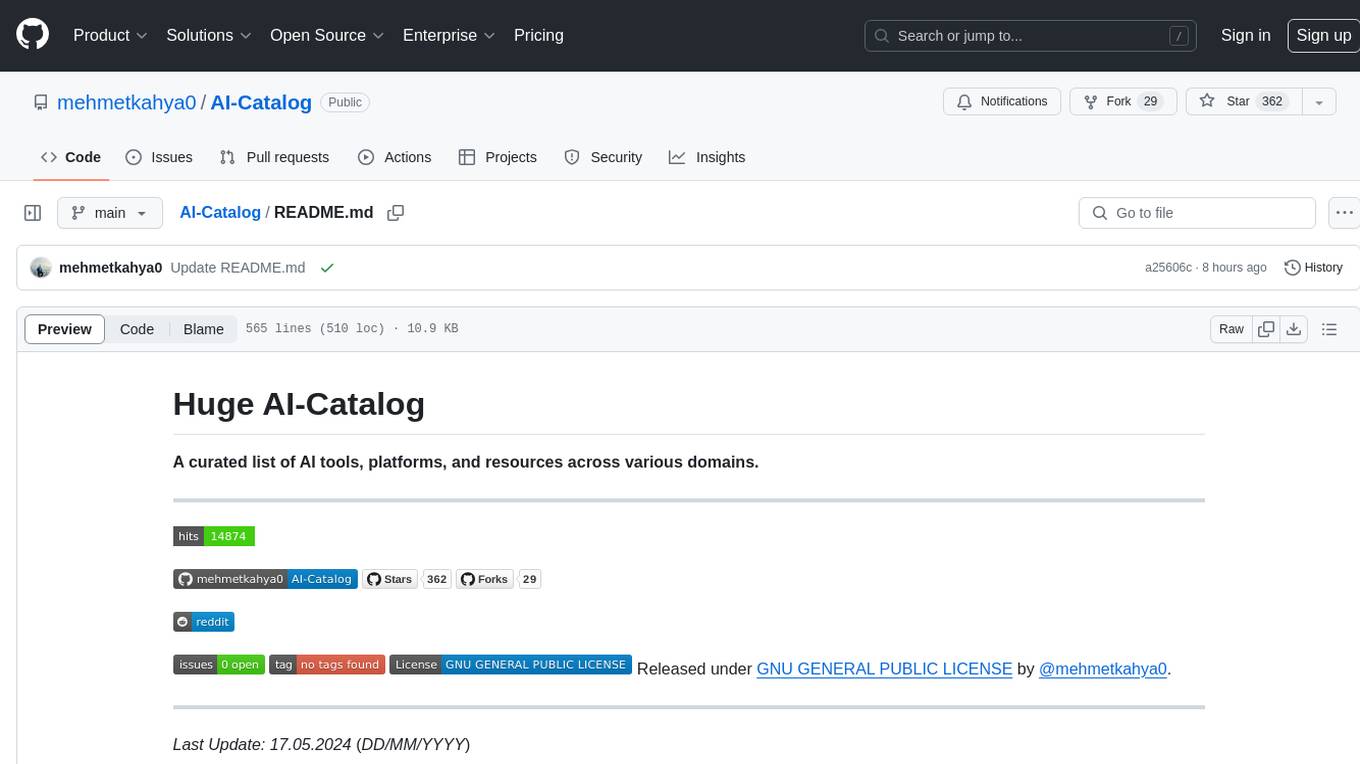
AI-Catalog
AI-Catalog is a curated list of AI tools, platforms, and resources across various domains. It serves as a comprehensive repository for users to discover and explore a wide range of AI applications. The catalog includes tools for tasks such as text-to-image generation, summarization, prompt generation, writing assistance, code assistance, developer tools, low code/no code tools, audio editing, video generation, 3D modeling, search engines, chatbots, email assistants, fun tools, gaming, music generation, presentation tools, website builders, education assistants, autonomous AI agents, photo editing, AI extensions, deep face/deep fake detection, text-to-speech, startup tools, SQL-related AI tools, education tools, and text-to-video conversion.
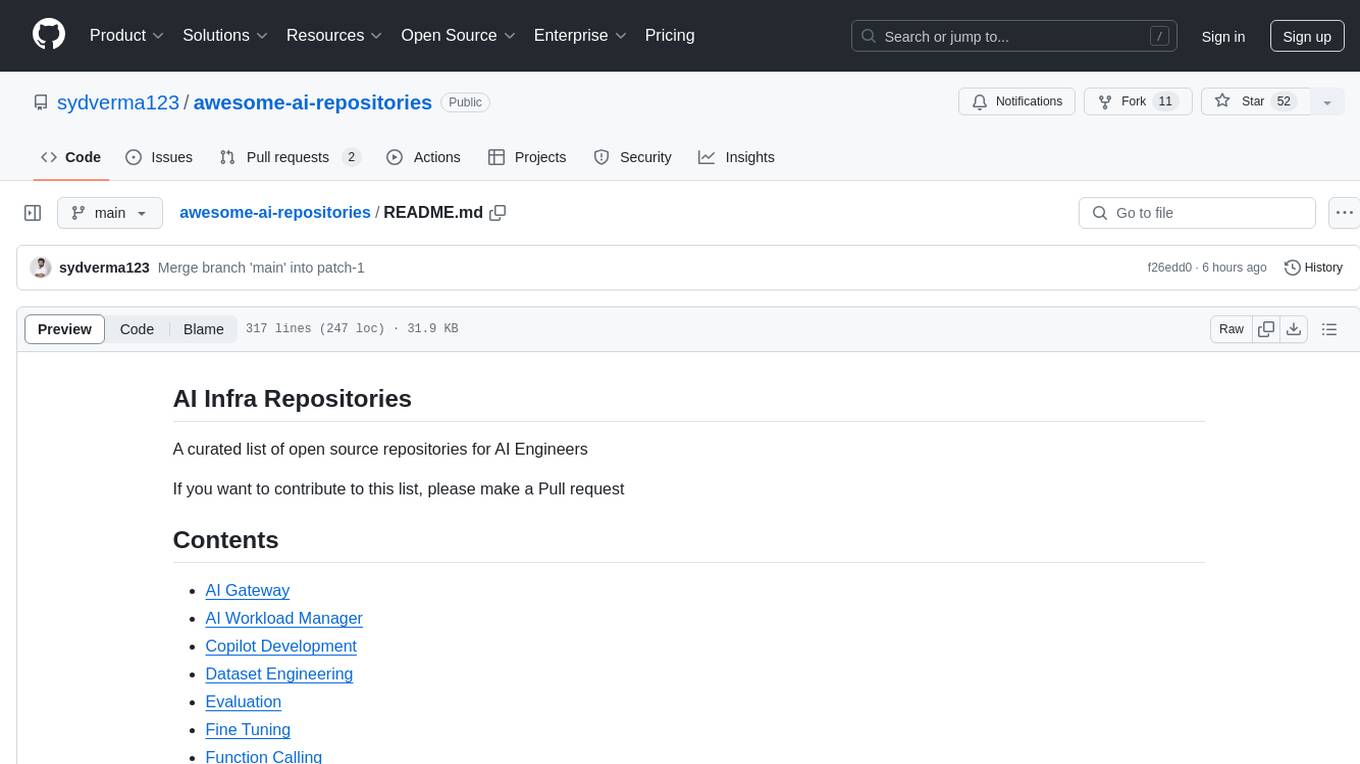
awesome-ai-repositories
A curated list of open source repositories for AI Engineers. The repository provides a comprehensive collection of tools and frameworks for various AI-related tasks such as AI Gateway, AI Workload Manager, Copilot Development, Dataset Engineering, Evaluation, Fine Tuning, Function Calling, Graph RAG, Guardrails, Local Model Inference, LLM Agent Framework, Model Serving, Observability, Pre Training, Prompt Engineering, RAG Framework, Security, Structured Extraction, Structured Generation, Vector DB, and Voice Agent.
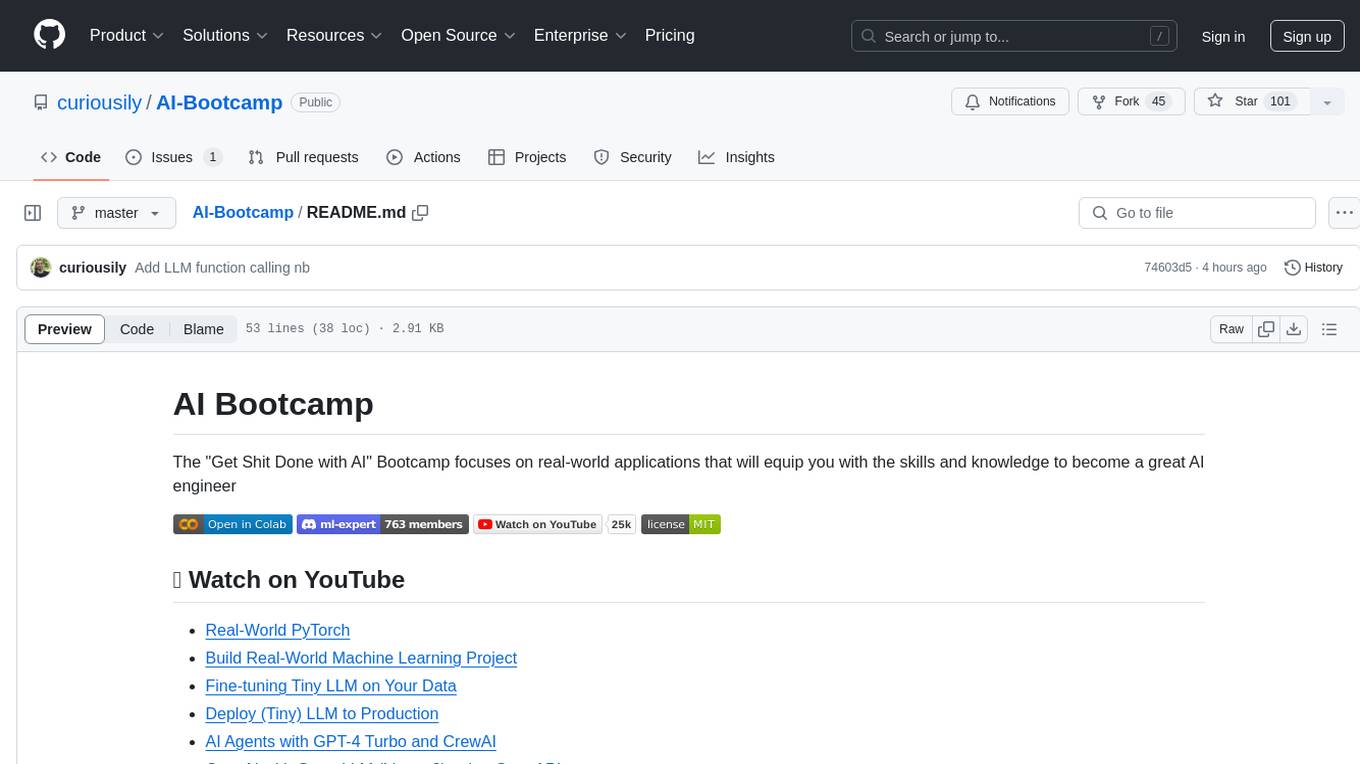
AI-Bootcamp
The AI Bootcamp is a comprehensive training program focusing on real-world applications to equip individuals with the skills and knowledge needed to excel as AI engineers. The bootcamp covers topics such as Real-World PyTorch, Machine Learning Projects, Fine-tuning Tiny LLM, Deployment of LLM to Production, AI Agents with GPT-4 Turbo, CrewAI, Llama 3, and more. Participants will learn foundational skills in Python for AI, ML Pipelines, Large Language Models (LLMs), AI Agents, and work on projects like RagBase for private document chat.
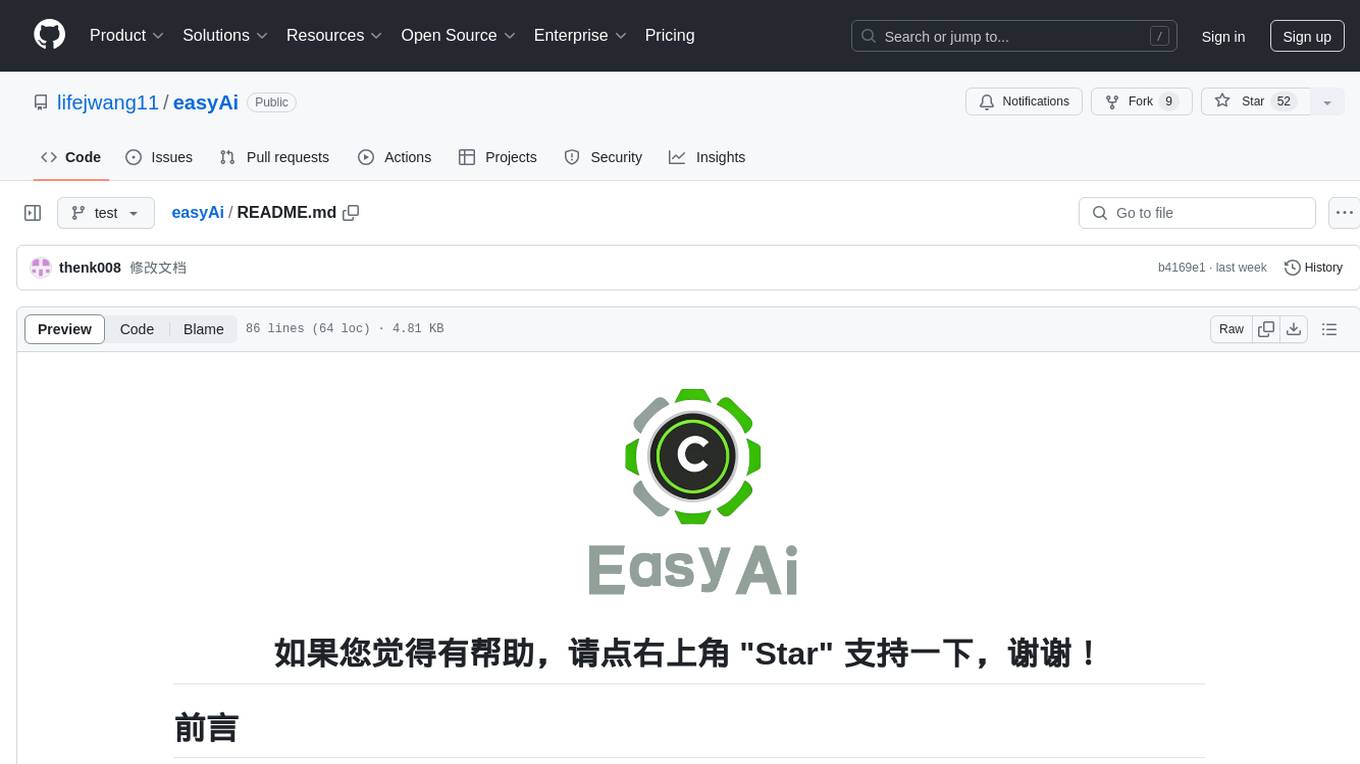
easyAi
EasyAi is a lightweight, beginner-friendly Java artificial intelligence algorithm framework. It can be seamlessly integrated into Java projects with Maven, requiring no additional environment configuration or dependencies. The framework provides pre-packaged modules for image object detection and AI customer service, as well as various low-level algorithm tools for deep learning, machine learning, reinforcement learning, heuristic learning, and matrix operations. Developers can easily develop custom micro-models tailored to their business needs.
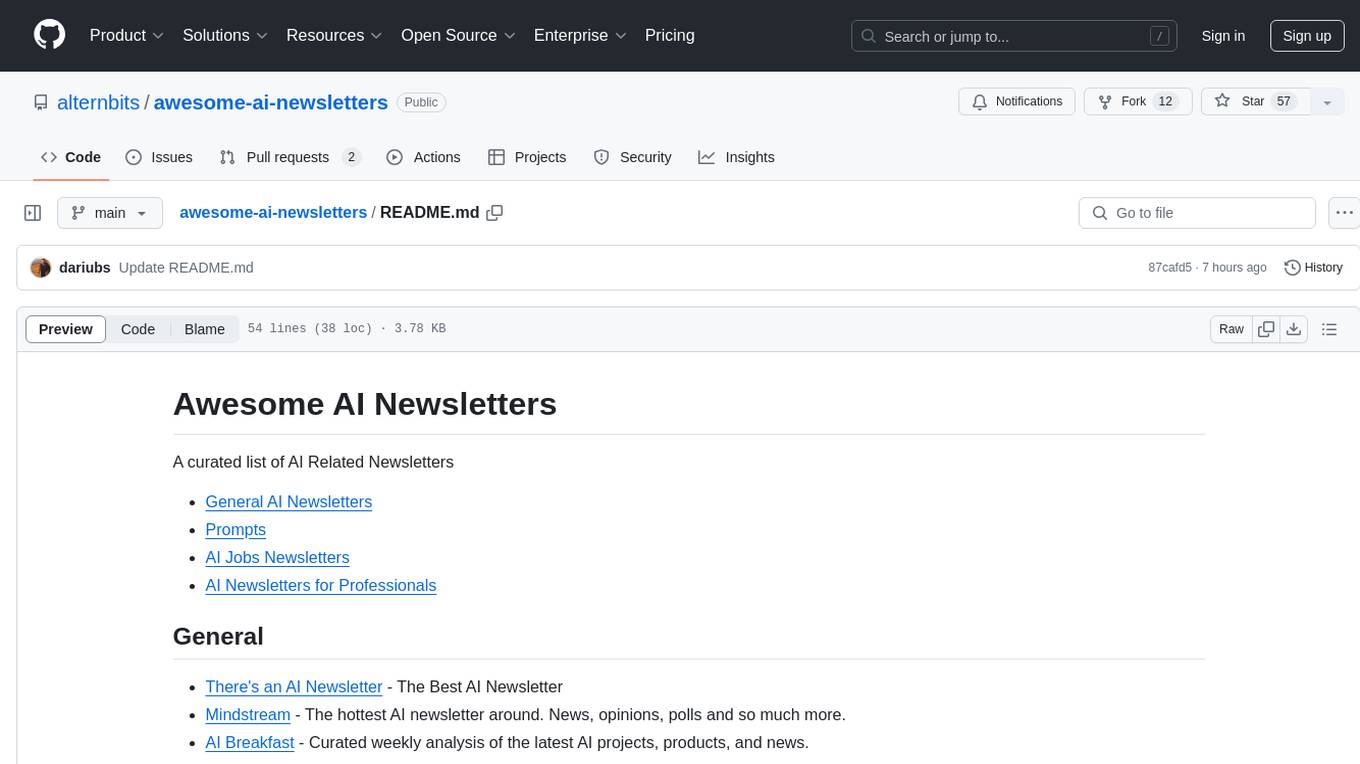
awesome-ai-newsletters
Awesome AI Newsletters is a curated list of AI-related newsletters that provide the latest news, trends, tools, and insights in the field of Artificial Intelligence. It includes a variety of newsletters covering general AI news, prompts for marketing and productivity, AI job opportunities, and newsletters tailored for professionals in the AI industry. Whether you are a beginner looking to stay updated on AI advancements or a professional seeking to enhance your knowledge and skills, this repository offers a collection of valuable resources to help you navigate the world of AI.
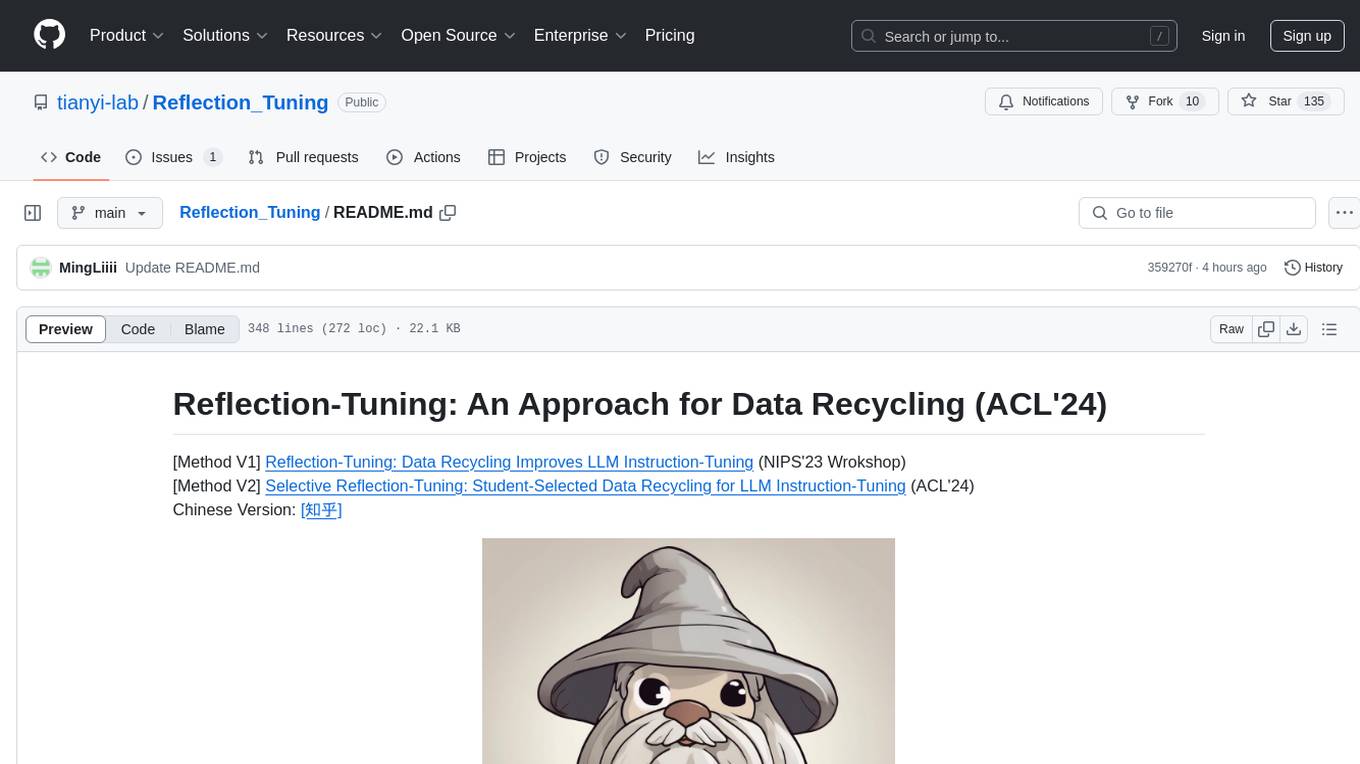
Reflection_Tuning
Reflection-Tuning is a project focused on improving the quality of instruction-tuning data through a reflection-based method. It introduces Selective Reflection-Tuning, where the student model can decide whether to accept the improvements made by the teacher model. The project aims to generate high-quality instruction-response pairs by defining specific criteria for the oracle model to follow and respond to. It also evaluates the efficacy and relevance of instruction-response pairs using the r-IFD metric. The project provides code for reflection and selection processes, along with data and model weights for both V1 and V2 methods.


